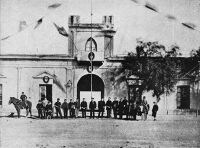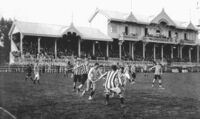Alumni Athletic
 | ||||
| Full name | Alumni Athletic Club of Archangels | |||
|---|---|---|---|---|
| Nickname(s) | Magistrati (The Magistrates) Tsiteli Dapnebi (The Red Laurels) Mdidrebi (The Wealthy) Rizos (The Rizos) | |||
| Short name | Alumni | |||
| Founded | 1 March 1919 | |||
| Ground | Nikola Berikashvilis Stadioni Archangels, Salikhia | |||
| Capacity | 23,200 | |||
| President | Ekhos Sabauri | |||
| Vice-President | Aleksandar Ghurtskaia | |||
| Manager | Lito Balanchivadze | |||
| League | Satsolivelos Bolnisiliga | |||
| 2023 | Bolnisiliga, 2nd of 22 | |||
|
| ||||
Alumni Athletic Club of Archangels, commonly referred to simply as Alumni (Salikh: ალუმნი), is a football association club of Salikhia. It was founded on March 1, 1919 in the city of Mtavarangelozi, after the union of Rubum Athletic and Virtus Proclus. It plays its matches at the modest Nikola Berikashvilis Stadioni, with a capacity of 23,200 spectators.
Alumni is proud to be considered the winningest club in the history of Salikhia, with more than 40 professional titles in its vast trophy cabinet, far surpassing the number of those of the second on the list, P.S.A Kapitalielebi, with 22, tied with Zorovi Wanderers, which has the same number of titles. The club has more than 91,000 active members, which makes it, by a small margin, the second most popular club in the country, with around 2.5 million fans spread across the nation, surpassed by the 3 million fans and 103,000 members of the first on the list, Kapitalielebi.
As the most powerful and - almost - most popular club in Salikhia, Alumni has worthy rivals to its legend, seeking to snatch its glory, of which two big names stand out: Zorovi Wanderers, with whom it disputes one of the fiercest rivalries in the world, the so-called Passion of Passions; and Kapitalielebi, also from Archangels, with which the city derby is disputed, called The People's Skirmish, thanks to the tempting generalization of linking the Alumni fans with the wealthier classes of the city of Archangels, and on the other hand, the Kapitalielebi fans with the lower strata of the society of that city, a formula that is unequivocally propitious for a rivalry. These three named clubs, in national folklore, are known as the Wealthy (Alumni), the Broke (Kapitalielebi), and the Lady (Wanderers).
History
'The Alumni Duel' (Before 1919)
A Rizealander general, named Zachariah Wolff, was hired to lead the first regular Salikh Legions and train them in the use of modern armaments in 1882. He embarked on the adventure with a group of assistants and a couple of his soldiers, and was granted an old fortification rebuilt with funds from the soravian-led State of Salikhia, which was named in Zachariah's honor as Fort Wolff. In that area functioned the legendary Rubum Institutus, with Solarian and Catholic connections. Over time, the colony expanded, which caused the student body of the Rubum to grow, and its influence allowed the adoption of Estmerish as the official language within the institution, along with Solarian.
These immigrants would introduce football to the city of Mtavarangelozi, which was quickly seen as a novelty by the locals, who were interested in practicing the sport. In the last decade of the 19th century, it became common for Rubum's rizealander - and salikh - students to practice football on its large campus; this caught the attention of the rectorate, which, seeing the rapid advance of the sport in the city, decided to order the creation of an official club, initially called Rubum Athletic Club. An immediate attempt was made to gain membership in the newly formed Amateur Archangeline Championship of Football Association - Curiously abbreviated as Archamp in official documents, and later by the common spectator -, which would only be granted in the 1901 edition.
Rubum Athletic would reap great performances in its first years within the Archamp, such as a runner-up in its first participation, and three championships, in 1902, 1903 and 1904; After that, their dominance would be interrupted by Virtus Proclus, the club of the Polytechnic University of Mtavarangelozi, which would win the 1906 championship, automatically becoming Rubum's first rival, a confrontation that would be popularly known as the Alumni Duel, since as time went by, the best players gaduated from the universities they represented, so that more and more, Rubum and Proclus were evidently made up of more alumni than actual students.
The Rubum were identified by their red clothing, while the Proclus wore white. Rubum were nicknamed The Rizos for their notable Rizealander ancestry, and Proclus were known as The Pigum (The Lazy), a derogatory nickname given by Rubum fans for their opponents' tendency to score big in the first half, only to falter and be pegged back in the second half. This nickname was surprisingly appropriated by the Proclus fans themselves.
For the late 10's, after the retirement of many of their stars, both clubs had drastically decreased their level, a factor that especially spiced up the duel of 1919, as the Grand Championship, the first official football tournament in the State of Salikhia, with clubs from all over the territory; so with the intention of reaching a number of 20 teams, with 21 willing to participate, the Football Union of Salikhia decided that the two lowest ranked teams in the last edition of the Archamp should play a playoff match, in which the loser would be banished to play in the B Championship, the planned Second Division. Coincidentally, these two teams were Rubum and Proclus, so on February 8, 1919, both teams would face each other at Rubum's stadium.
The Alumni Duel of 1919 ended in an epic 7-7, which would force a rematch on February 11, a 2-2 draw, on February 15 the result would be 3-3, on February 21 a boring, souless 0-0, and on February 27, finally Rubum would beat Proclus by a 4-2 score. However, in view of the enormous parity, and - despite the fact that at that time they did not want to recognize it - the similar histories between both clubs, on March 1, 1919 an agreement was reached between The Rizos and The Pigum, which would unify Rubum and Proclus under the name that once confronted them, we are talking about the foundation of the Alumni Athletic Club of Archangels.
The 'Grand Championship' (1919-1934)
Professionalism (1919-1928)
Great War & Disaffiliation (1929-1934)
The absorption of the 'Granchamp’ (1935-1982)
The Battle for Consolidation (1935-1951)
'We don't win, we don't lose' (1951-1953)
Golden Era (1954-1971)
Gardos’ Era (1971-1978)
‘Dark times for Alumni’ (1979-1982)
Independence & Christmas' Revolution (1983-1984)
Bolnisiliga (1985-)
The Renaissance (1985-1999)
The New Millennium (2000-2017)
‘Alumni, the Salikh shooting star’ (2018-)
Emblem and Colours
Infrastructure
Academies (Youth/Coaching)
Board and Staff
Players
Current Squad
Bold players are CdV24 starters.
Note: Flags indicate national team as defined under international eligibility rules. Players may hold more than one nationality.
|
|




